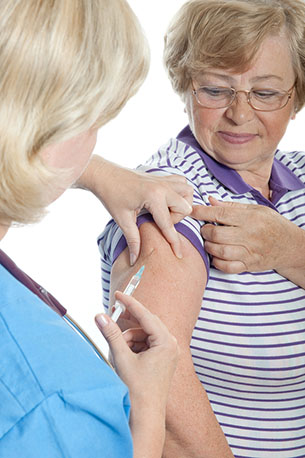The 2017/2018 flu season hit hard and fast. In many countries, it was one of the most severe flu seasons in years. The 2018/2019 flu season will soon start. Now is a good time to start preparing for the flu season. The CDC just issued the guidelines for the upcoming flu season. Here's what you need to know.

Flu Season Runs from November to February
You can get the flu at any time. Generally, it's most prevalent from the beginning of November to the beginning of March. You may find that it spreads fastest when kids are out of school on winter and holiday vacations or after large gatherings like Christmas parties and Thanksgiving.
The flu picks up in winter months as people tend to be confined inside more. Colder weather keeps windows shut, so germs get trapped inside and circulate to people within the building or home.
Seniors Shouldn't Skip the Flu Shot
It's recommended that everyone over the age of six months gets vaccinated. It's best to get vaccinated before October, which is when the flu season starts to kick into high gear.
Your parents' options for the flu shot this year contain protection against Influenza A and B/Victoria. The CDC approved a nasal flu vaccine again, so there is that option. Otherwise, the vaccines being offered will all be four-component (quadrivalent) vaccines.
Recommendations remain that seniors who are at least 65 years of age get the high-dose vaccine from Fluzone. It offers the best protection for seniors who have a slower or compromised immune system.
Dangers of the Flu
One of the biggest dangers of the flu is the risk of developing pneumonia. The flu virus can range from mild to severe as the virus makes itself home in the nose, throat, and even the lungs. Common symptoms are a fever, chills, cough, body and muscle aches, and headache. Exhaustion and fatigue are also common.
If the flu gets into the lungs and lingers, it may lead to pneumonia. If this occurs, it can become dangerous. Medical attention is important if you suspect your parent has pneumonia. The flu can also cause an inflammation of the heart or brain in rare cases. It's very important to monitor a parent with heart disease if the flu is present.
What Do You Do if Your Parent Gets the Flu?
If you suspect your mom or dad has the flu, call his or her doctor. There are medications that can help lessen the symptoms. Make sure someone is available to help them stay hydrated and well nourished. Soups and smoothies may work best. Home care services can help if you can't get time off from work.
Talk to a home care agency about the different services available in your area. Your mom and dad may benefit from transportation to and from the doctor's office, meal preparation, and housework. All it takes to get started is a quick phone call.
If you or an aging loved-one are considering hiring Home Care Services in Westwood, CA, please call Mom's Home Care and talk to our friendly, knowledgeable staff. Our number is 323-244-4789













